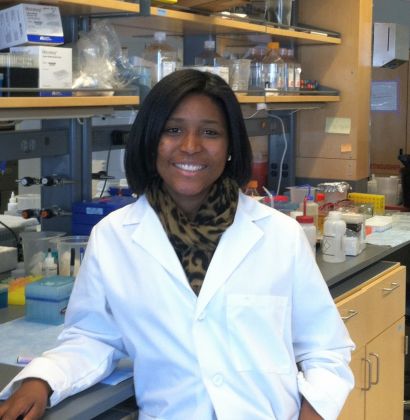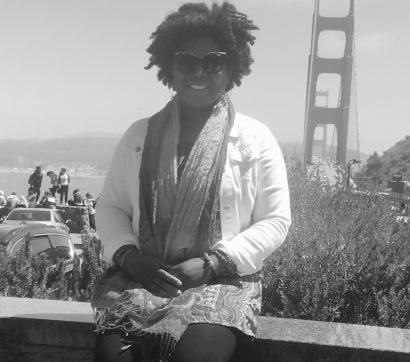- About
- Organization
- Organization Overview
- Dean’s Office
- Department of Bioengineering and Therapeutic Sciences
- Department of Clinical Pharmacy
- Department of Pharmaceutical Chemistry
- Quantitative Biosciences Institute
- Org Chart
- Research
- Education
- Patient Care
- People
- News
- Events
Meet D’Anne Duncan
Newest face on campus
By Katherine Krebs / Tue Aug 29, 2017

D’Anne Duncan, PhD
The newest face on campus is D’Anne Duncan, PhD, who just moved here from Nashville, Tennessee.
Before joining UCSF as the Graduate Division’s Director of Diversity and Outreach, Duncan served as the Associate Director of the NIH’s Broadening Experiences in Scientific Training (BEST) Consortium, where she both developed and managed various national initiatives of the 17 member institutions. UCSF is one of those institutions and, as a leading university, it stood out to Duncan, who decided to further her career here.
“I’m excited about working at UCSF. I’ve had my eye on UCSF for a long time. The way UCSF approaches new research questions, develops creative strategies, and disseminates novel findings is exemplary. UCSF’s willingness to implement innovative ideas, particularly in the area of biomedical graduate education and training, energizes me.”
Duncan herself earned her PhD in Neuroscience from Northwestern University in 2011, and pursued postdoctoral training in visual neuroscience at Vanderbilt University.
Duncan has long been committed to advancing PhD education and training for biomedical doctoral and postdoctoral scientists of diverse backgrounds by designing professional development and mentoring programs that complement traditional research training. In addition to her role at UCSF, she will continue her work in various organizations devoted to these goals, including Broadening the Representation of Academic Investigators in NeuroScience (BRAINS) and the Graduate Career Consortium Diversity Committee.
In her role as Director of Diversity and Outreach, Duncan will be working with Julia Clark, Outreach and Student Programs Coordinator, on ongoing programs such as the Summer Research Training Program and the Initiatives for Maximizing Student Development (IMSD). She will undertake efforts to understand and evaluate the needs of our students; and she will develop and implement new initiatives, resources and programs in support of diversity and inclusion across our graduate programs. Duncan is looking forward to collaborating with the Office of Diversity and Outreach (ODO), too.
“ODO will be a great partner for me. I’ll be focused on the graduate division and partnering with other campus-wide initiatives and activities to enhance diversity and outreach.
“I’m also looking forward to collaborating with Professor Tejal Desai, particularly in her role as an advisor to the IMSD Fellowship program. I know she is passionate about working with young people; she regularly invites elementary school students into the laboratory, and also engages budding scientists at the high school level.”
This is a critical time for UCSF in terms of diversity and inclusion. With reference to the recent anti-women Google “manifesto” and the violence in Charlottesville, Virginia, Duncan said supporting graduate division students and postdoctoral fellows on these issues will be a priority in her new role at UCSF. In terms of nurturing a more just and fair society, she stressed the need to engage people when they are young. “Early education and exposure is key; the more exposed you are to diverse people and circumstances, the more you evolve. Being exposed and being open to exposure is more important than ever now. Recently, I spoke to a class of high school girls. When I asked, what image comes to mind when you hear the word ‘scientist’?, they all said ‘an old white male.’ They were very surprised to learn that I’m a scientist. Appropriate exposure at the earliest age is key.”
Duncan’s parents are from the Caribbean. “My mother is my hero,” she said. “She immigrated to the States at a very young age and persevered on her own. She is a strong woman who, by her example and fortitude, stood up for the importance of my education.”

Duncan exploring San Francisco.
From a young age, Duncan’s parents taught her the value of education, to treat everyone as an equal with kindness and respect, and to be inclusive to all—which is how she lives her life. These principles will serve as a catalyst in her role at UCSF. “Part of my job is to identify specific needs, and to fill in any gaps to enhance our community environment and make UCSF even better for our graduate students and postdoctoral fellows.”
Duncan loves her new apartment, saying that she appreciates San Francisco’s weather, diversity, and all the amenities of a major metropolitan area. She lives in SOMA and walks to work. She looks forward to recreation, exploring California’s great outdoors, sampling Thai food, and shopping. Until she has an opportunity to scope out the San Francisco music scene, she will continue to miss the breadth of Nashville’s affordable (and often free) concerts.
Looking toward her future, Duncan says, “I enjoy academia and being at an academic institution. Perhaps someday, I can become a dean. I want to make an impact for the broader university community. This could be in the areas of diversity and outreach initiatives, career and professional development, or perhaps even new initiatives. I want to leverage my background and merge these areas to enhance graduate education and training for all individuals. That’s what I aspire to.
“Meanwhile, I encourage all of us to enhance our exposure to different opportunities and people—that’s where the growth occurs. We can set that personal challenge for ourselves.”
About the School: The UCSF School of Pharmacy aims to solve the most pressing health care problems and strives to ensure that each patient receives the safest, most effective treatments. Our discoveries seed the development of novel therapies, and our researchers consistently lead the nation in NIH funding. The School’s doctor of pharmacy (PharmD) degree program, with its unique emphasis on scientific thinking, prepares students to be critical thinkers and leaders in their field.



